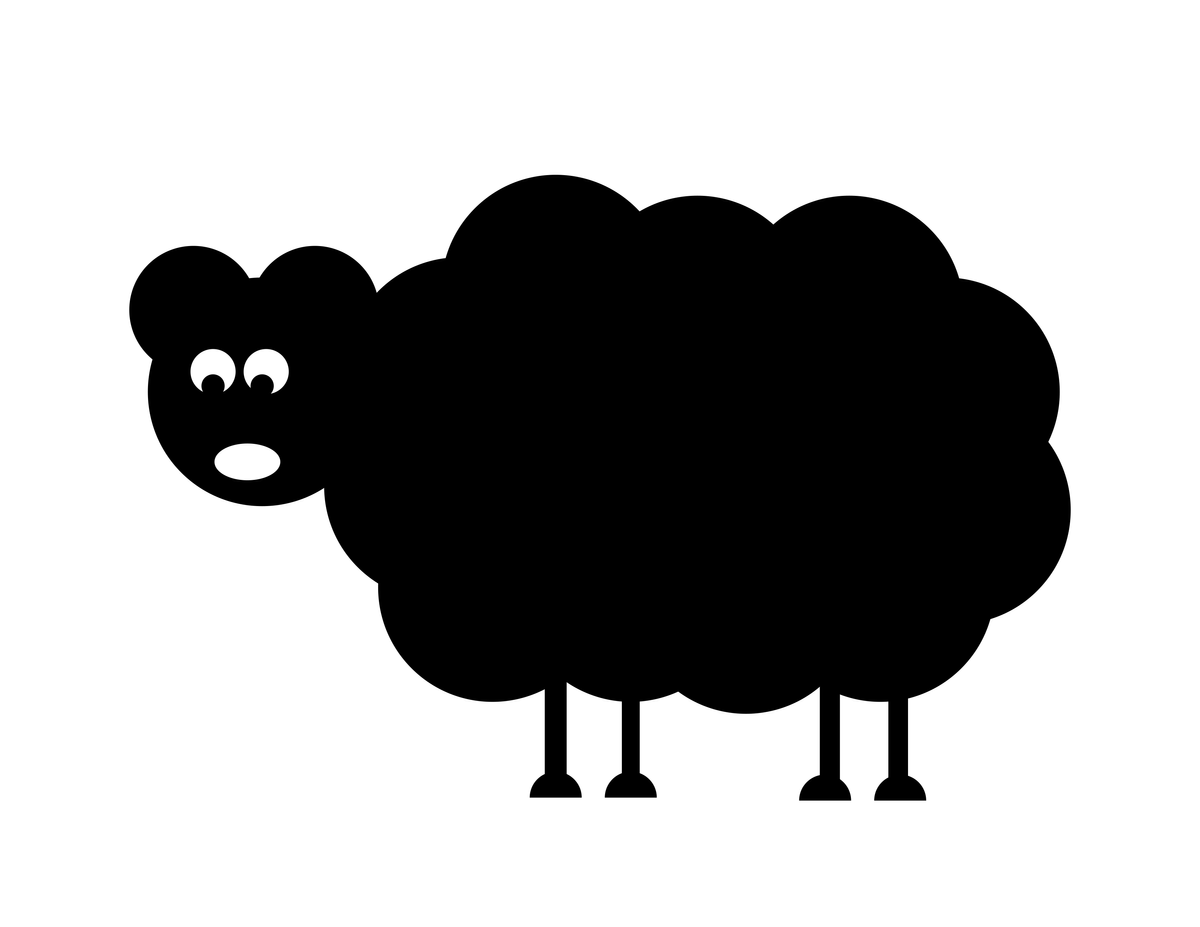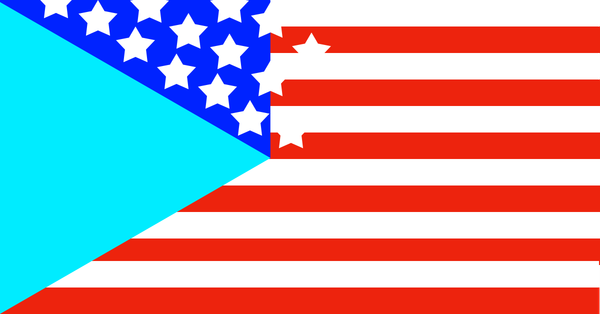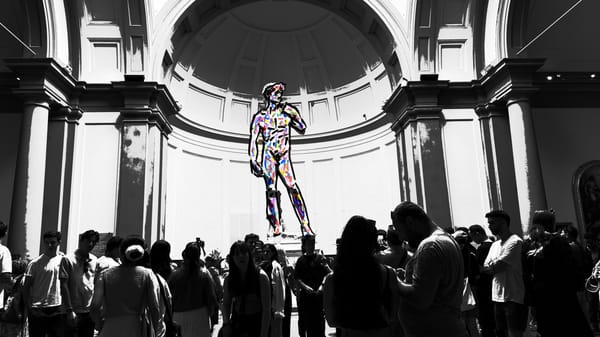17th century English Puritans were the original Black Sheep
An update and correction to last week's newsletter.

I wanted to unambigiously correct my newsletter last week Bah, Black Sheep. in which I came out with several theories about the origin of "black sheep". I was correct about several things:
There was a common Latin phrase used during the 17th century, Nigro carbone notandus, which was translated in a school primer as “marked for a black sheep” for untrustworthy people in the late 17th century. But that doesn’t exactly mean “black sheep”, it means “black coal”.
and
But the borrowing of the phrase seems to be uniquely English and Protestant.
The Oxford English Dictionary was completely incorrect on many levels. It has nothing to do with Jacob's Black Sheep in Genesis 30:32.
Jacob’s Black Sheep
There is a misconception about black sheep which progressed in the centuries since - that black sheep and black wool weren’t valued: they were very valued in the 17th century, according to various sources.
There was nothing inherently negatively about black sheep. In fact, according to most translations (and to the original), Jacob’s sheep weren’t even black, they were chum - a brown or a very dark red. The first Welsh bible translates it as Goch-ddu, which you may remember as dark red.
And King James’ son’s tutor Andrew Willet wrote in 1608 on the book of Genesis:
The third word is chum, not blacke, as some read, for they belonged to Laban, nor [red], or yellowish, but rather brown, as of a soot-color, which is caused by [smoke] and heat, for so chum signifieth heat: the septuigant read phaion: all the sheep… or of duskish colour, are separated for Jacob.
According to him, the fact that Jacob wanted to get the striped and spotted goats was just a form of locational arbitrage, as he was moving back to Canaan, where those were more favored.
Herein appeareth Gods providence towards Jacob, that whereas the white and black sheep were most set by in Mesopotamia, the particolored in Palestina…. is so falleth out, that Jacob being to return to Canaan, is [increased] with that kind of sheep.
This is one of the examples I wrote about in Translating Biblical Colors where it becomes very difficult to know exactly what the word meant.
The Origins of the Untrustworthy Black Sheep
The term “Black Sheep” was originally used to describe the Puritans. I’m unsure if it was originally used as a sobriquet to describe themselves or by others in a negative epithet. Or both.
Black Clothing
It could be have been because they chose to dress in black and referred to all Christians as "sheep" and that Pastors were not needed. It could be that they then took that literally:
Where I saw many men in black attire;
There took a little room one after other,
And hereupon I did a little hover
To see the period of that Conventicle,
Or-Private Meeting; staying there a little,
I saw their black all covered with white,
And Some so dres[sed] they did me somewhat fright:
For they had things upon them of the shape
Of black Sheep-skins, w[hich] hung down as the cape
Of Cloaks,
Though, admittedly, I'm not sure how literal this source was.
Black Belief
Or it could have been theological as well, but I think this is a secondary reason. As noted Puritan Minister, Samuel Smith, in a 1631 sermon which went through more than 30 reprintings, stated in a chapter which begins talking about being sheep.
Question: But this may [seem] strange: for the Church confessed before, that she was black and Sun-burnt, deformed, etc. How then can Christ call her fairest among women.
Answer. The Church, and every true [believer], are black and deformed in themselves, vile and [unclean], and can see no beauty in themselves, but are blemished.
and just in case it isn't completely clear that already at that time the Puritans had been referred by "nigro carbones notati":
and if they shall [spy] out one blemish, or [infirmity], or [weakness], by and by they blaze abroad with an open mouth, note them with a black [coal], calling them [Puritans], Precisians, Hypocrites, and the like, reviling them in the most odious manner.
Theatre
We can see from these above sources that the Puritans were in fact associated with black sheep, and it was known by both them and their opponents.
In The Puritan; or, the Widow of Watling Street, attributed to W.S. (William Shakepeare), we see the dialogue:
Frail: Foh – He’s neither [smoke-dried], nor [scorched], nor black, nor nothing, I tell you, Madam, he looks as fair to see as one of us; I do think, but if you saw him once, you’d take him to be a Christian.
Fran: So fair, and yet so cunning, that's to be wondered at, Mother.
Already from Shakespeare’s All's Well That Ends Well: it became clear that Puritans were already not associated with honesty. First of all, the Puritan's name was Charbon (carbone / coal), which was already a black mark. Also:
Though honesty be no puritan, yet it will do no hurt; it will wear the surplice of humility over the black gown of a big heart.
The actor and playwright Richard Brome went penniless when the Puritans shut down the theatres in 1642. Sometime between then and his death, he wrote a play which was printed and performed after his death with two different titles - The Queen's Exchange or The Royall Exchange. The play was set during Anglo-Saxon times.
Kings, Fools and Favourites never shall
agree.
And many years after we are in our graves,
Fools shall be Knights, and Favourites
shall be — known
From black Sheep, I prophesie.
Dictionary
In a French dictionary from 1660, the mere word puritane was translated to “hypocrite” and “bigot”. Also in another, "Tartuffe" was a Hypocrite or Puritan.
Overview of Black Sheep
We see that the Puritans were considered hypocrites, bigots, cunning, false, and so much more. As we saw last week there were other common traits associated with black sheep.
- Untrustworthy
- Conmen
- Corrupt
- Traitorous
- Good looking / Presenting Well
Untrustworthy and Corrupt
The Puritans would use pamphlets, insinuations and lies. They were well-heeled anarchists. They focused on character assassination and were actively situated themselves into the positions of power. They would ask seemingly innocuous inane, nit-picky questions and start rumors, leading to the imprisonment and death of numerous pastors.
Disinformation as a Goal
Preachers from the Church of England were at risk to be discredited or even killed. The point was often to raise suspicion and sow seeds of doubt. The point wasn’t necessarily to supplant it with something else.
under the same [pretense] of Reformation, having been taught to hate Popery without discretion; no marvel if such people now question their teachers, and think they have forfeited their power and knowledge to them, whom they have taught no better; and what use these men have made of this pretended power
Preachers had to be careful.
and the Priests be thought to go so awry; and in these times, to the Lawyer must the Divine go, if he will preach without [fear] of being made a scandalous Minister, or imprisoned for every Sermon
The Puritan contingency in Parliament was quite adept at using political power to achieve these ends.
this made the Faction in the House of Commons never to transmit any Bills against any particular accused Clergyman to the House of Peers (where indeed lay judiciary power) to a Legal hearing; but knowing [well] such foggy charges would [soon] vanish at the face of justice; these evil spirits kept on their course of casting [mists] before the peoples eyes, to make them [think] that the lights of the Church burned so [dim], that it was necessary to snuff them, or quite put them out
Bad Faith
More than just personal attacks, they would use bad faith arguments, that sounded intellectual, against things in the Church of England. Sowing the seed of impropriety, and causing doubt where none existed were a few of the tools of their trade.
One of the Puritans, a Dr. Coal, had written a letter to a local bishop, criticizing the altar (a term used to describe the communion table), Coal was meant to highlight the zeal, connected with the zealots who killed Aaron’s sons.
To paraphrase a Church of England response: this coal was from a smith’s oven, not the altar.
Sounding Smart
Part of the problem was that they didn’t actually know Latin, Greek, or Hebrew, and they weren’t very educated. Like this exchange between a Puritan attempting to get his doctorate in 1660.
…when he came back to the University to go out Doctor, and would needs take upon him to answer the Divinity Act, which he performed so contemptibly, that he was hissed and scorned publickly by all the Auditors, and accordingly censured by Doctor Prideaux, who reprehended him sharply in publick for his ignorance and [insufficiency]: and some Papists, who are commonly present at such publick Acts among the multitude, hearing him to be so destitute of Latine, Logick, and distinctions upon the state of his questions, publickly were heard to say,—Alas poor black sheep, what maketh thee here?
Proto-Orwellian
In fact, I would not be surprised if in 1984 George Orwell’s Newspeak and Doublethink was influenced by the 17th century and the Puritans. Winston has a neighbor “Parsons” and the party slogans of “War is Peace” and “Ignorance is Strength”, and the line “The chief of all the capitalists was called the King…”, which may be 1930s and 1940s era totalitarian propaganda, it has its roots in the Puritan propaganda of the 1630-60s. The Long Parliament which held power during the interregnum period, can be called “the party”.
Difficulties in research
One note I need to make is how difficult this particular research has been. I say this as someone who regularly reads sources in numerous languages and time periods.
Who is a Puritan?
In the beginning of the previous book, the author has a letter of dedication (the epistle dedicatory), in which he talks against the “false accusers” and the “Traytors”, which sounded like he was talking against the Puritans. But I double-checked multiple sources, and in fact, he was a Puritan minister.
The irony was that he was reading a page out of the Puritan playbook for discrediting any of their enemies.
This has not just difficult for me, I found solace that many historians from various time periods have found it difficult to write a true history of the Puritans in England, because it is not always clear who was a Puritan.
Who is a certain polemic against?
The other problem is that the Puritans weren't the only people who the King and the various Church of England people would be writing against. They even aren't the only group who attempted acts of the capital treason in the 17th century.
There was weird political structure happening in the when King James I came to power. The pope has a papal bull saying that whoever would take over from Elizabeth should be killed. A group of Papists (Catholics) and Jesuits spent a few years plotting and planning to blow up Parliament at Whitehall (while the king was in attendance).
While the Gun-Powder Treason (as it was called) was foiled, and some of the treasonous participants executed, the king and Parliament decided to require a simple Oath of Allegiance, with the intent to have people who agreed to take it that Pope didn’t have the power to decide who should or shouldn’t be the monarch of England. That day, November 5, would be celebrated as Guy Fawkes Day, one of the failed plotters.
I discovered a late 17th century source which referenced a black list written by a king of England, of individuals who would be nigro carbones, and how King James I decided not to include the
The Sect of King James's old Enemies in Scotland the Puritans, and whom he said he found there more dishonest than the Highlanders and Border-Thieves, is not named in that Book; and he having cleared them from being participants in the Gun-powder Treason, did with Justice as well as perhaps with hopes of their emendation alter the Tenets of Loyalty that had been then lately published by the English Non-Conformists, order that Sect not to being that Book marked Nigro carbone.
But it was a “damned if you do, damned if you don’t” situation:
Indeed, James was disposed to act with all possible leniency. Cruelty was foreign to his nature. Had the Romanists remained quiet, none would have been punished during his reign for their religious principles. Nay, so leniently did James act, even after the discovery of the gunpowder treason, that the puritans hesitated not to charge him with leaning towards popery.
Treason
John Donne later gave a sermon at Whitehall, in which he mentions a few things. One that there was river white drink from, and they turn black. The second was that the black sheep were still part of society. People, under the current king, weren’t persecuted for beliefs.
He reiterated that they turned to treason, because they had committed to martyrdom, something he blamed the pope for.
men, who (as he adds there) do sacramento spondere sanguinem, take an oath at Rome that they will be hanged in England; and, in whose behalf he complains de sterilitate martyrii, that there is such & dearth of martyrdom, that they find it hard to be hanged; and therefore, (perchance) they find it necessary to enter into powder plots, and actual treasons, because they see that for religion merely, this state would never draw drop of blood, et sacramento sanguinem, they have taken an oath to be hanged, and are loath to be foresworn.
Donne also spoke about how even the devil has his own sheep which he sends to cause his own problems, but it seems that the devil’s sheep are red, not black.
Donne also talks about defamation of character is wielded as a weapon:
This I have feared, because heretofore the inobedient puritans, and now the over-obedient papists, attempt you. It hath hurt very many, not in their conscience, nor ends, but in their reputation, and ways, that others have thought them fit to be wrought upon.
Conclusion
I could cite dozens of more sources connecting the Puritans to both black sheep and nigro carbones. I could cite scores of sources listing their hypocracies, acts of character assasinations, and actual assasinations. I could write about the Puritan Oliver Cromwell's act of regicide. I could tell you histories about Puritan names.
I'm assuming that they became associated with black sheep some time after the Gun-Powder Treason of 1605. I can't narrow it down much more, but it is apparent that all of the negative connotations associated with black sheep were even evident within the Puritans from that period.



